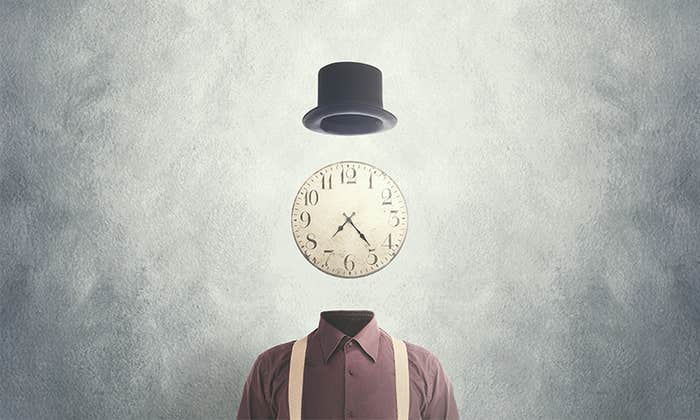Several years ago, a British man named Harry picked his nose. A hidden camera recorded him in this private moment, then someone uploaded the video to the internet, and soon Harry’s pratfall exploded into a worldwide meme. Millions of people—most of them in the United States—became obsessed with the video. Everywhere Harry went, strangers shot significant looks at him and touched their nostrils, as if to say, “Hey, you’re that nose-picking guy!”
Harry loved the attention—he described his fame as a “safety blanket” and said he felt as if everyone on the street had become his friend. But there was a problem with Harry’s internet stardom: No one else could perceive it.
In a parallel reality where most of us live, Harry had been diagnosed with psychotic delusions, many of them seemingly borrowed from the YouTube videos he obsessively watched.
If lining a hat with tinfoil gives a person a sense of power, wonderful. Let’s do it.
His family convinced him to visit a mental health clinic affiliated with the University of Birmingham. There, he enthused to his clinician—Rosa Ritunnano—that he was “the happiest man in the world.” Harry told Ritunnano that he could read and control other people’s thoughts; he deployed his telepathy to battle the lizard-humans and the Illuminati at the center of a web of power. These enemies, for their part, surveilled him through hidden cameras and telepathic spies.
As nightmarish as that all might sound, Harry relished the attention from the imaginary conspirators who monitored him. “If I found out that they [were] not watching me and reading my mind, I would feel alone and crazy,” he explained to Ritunnano.1
Though he was engaged in an apocalyptic psi war, Harry was also a remarkably pleasant fellow who seemed to pose no threat to anyone. He did refuse his prescribed antipsychotic medications, but when Ritunnano and her colleagues asked him whether he would submit to a battery of pencil-and-paper tests, he cheerfully agreed. And so the doctors administered some whimsically named tools that are used to measure self-worth, including the Purpose in Life Test, the Life Regard Index and the Existential Meaning Scale. Harry aced them all.

In the past decade, the Hearing Voices Movement, a federation of people who experience auditory hallucinations, has pushed the medical community to acknowledge that their symptoms can be a meaningful adaptation to trauma.2 Ritunnano belongs to a compatible movement among caregivers—when she met Harry a few years ago, she had just started her Ph.D. in a field known as phenomenological psychopathology, which puts the doctor’s sense of reality on an equal footing with the patient’s.
In Harry, Ritunnano saw a teacher. She thought she could “learn something about what it means to be happy” from him. At the same time, she struggled with her obligations as his clinician: How was she supposed to help a man like Harry?
Clearly, his psychosis had cost him some heartbreaking losses. Due to Harry’s odd behavior, and concerns that his children might be at risk, he was barred from seeing them for a period. Even when he was able to see his children more regularly, Harry often spent his days glued to YouTube, addicted to videos about the flat Earth and other conspiracies, making it impossible for him to work and damaging his family life. And yet he reveled in his imaginary superpowers, which he told Ritunnano connected him to all of humanity. Now, he said, all “people are like a family for me.”
They are always struggling to find human connection.
Ritunnano isn’t the only one asking such questions. Louise Isham—a research clinical psychologist at the University of Oxford—told me that she first began to grapple with ethical dilemmas connected with delusions after she met a female patient who believed she worked undercover as an MI5 spy. The patient’s “missions” let her imagine that she was rushing around the world to battle villains and gave her a sense that she was serving her country. So even if doctors could find a way to bring the patient back to reality, would that be the right thing to do?
This question inspired Isham to scour the psychiatric literature for guidelines on how to treat patients with “grandiose delusions.” (The term is psychology-speak for delusions involving fantastical powers or secret knowledge.) As it turned out, there were no clear guidelines. Isham realized, “this is an area that’s massively under-researched.” She told me, “there is a genuine problem that I’ve witnessed in clinical services, where you can see the harm that’s coming from a patient’s grandiose delusions, but there’s also a clear benefit to the belief, and there is a real lack of empirical literature that tells us what to do about that.”
Patients with “superpowers” might decide to fly off the top of a building or to baptize strangers—and often they may be so busy with their imaginary role that they lose their real-life jobs and become socially isolated. And yet, “given the benefits that people can get” from their delusions, Isham said, “you have to be really careful not to go in and make things worse.”
In order to learn more about this condition, Isham and her colleagues identified patients with grandiose delusions and polled them about their experiences as messiahs, secret agents, and conspiracy-investigators. You might think people described as “grandiose” would dream themselves into the billionaire class and indulge selfish desires—if you have godlike superpowers then why not sail an imaginary yacht to Macau and win every hand of blackjack? But Isham and her coauthors found that most of the patients had created a fantasy world where they performed selfless acts, even miracles, to help others.3 About 70 percent of these patients reported that their “special powers” helped them to make other people happy and to protect others from harm.
Perhaps the inner life of these patients tells us something more universal about the search for meaning: For most of us, self-worth depends on being useful to others. And we, like Harry, are always struggling to find human connection—but he and others with psychosis might get that need met more easily by communicating telepathically with fictional strangers than in person with family or friends.
As Isham said, “This is a very misunderstood group of people.”

Caroline Mazel-Carlton would agree with that. She told me that she heard her first disembodied voice after being abused by a daycare worker. The woman—who had hit young Caroline and scalded her with chemical cleaners—was chatting with another adult, and said, “It’s such a nice day. Not a cloud in the sky.”
That’s when the voice in young Caroline’s head spoke up: “She’s lying. I hate her.” Mazel-Carlton told me that the voice—she would later name it “Frank”—didn’t frighten her at first. If anything, he seemed to be coming to her defense. But later, voices turned into a swarm of tormentors. As a teenager and young woman, Mazel-Carlton bounced from mental hospitals to jail cells, where doctors numbed her with pills.
In her late 20s, Mazel-Carlton detoxed from psych meds and learned how to tame and soothe even the most frightening voices in her head, including “Frank.” If Frank orders her to throw a chair across the room, for instance, she can “satisfy” him, by simply touching the chair or turning it over.
Like an improv actor, she jumps into their stories with them.
Nowadays, Mazel-Carlton uses her lived experience to guide other people—she’s the director of training for the Wildflower Alliance in Western Massachusetts. A support network that’s aligned with the Hearing Voices Movement, the Wildflower Alliance brings together a community of peers to cope with voices, visions, and other “extreme states.”
Years ago, when Mazel-Carlton was on the other side of the consulting table, the doctors would ask her whether she was hearing voices, yes or no? And the conversation would usually end there—with a diagnosis and a prescription for meds. But now, as a caregiver, she explores her clients’ hallucinations with probing questions that her own doctors never bothered to ask: “Do you want to share what your voices say? How do they make you feel? Do your voices remind you of anyone you’ve known in the past?”
Mazel-Carlton said that “as mental health professionals, we’re not really doing our job if we’re not looking for meaning,” and she emphasized that caregivers should recognize that psychosis can be a survival tool. As an example of that, she told me about a man she’d met in a locked psychiatric ward who announced that he was the president of the United States. The patient “had been through horrific institutional trauma. He was once stripped naked and handcuffed to a sink by police,” she said. And now the psychiatrists on the ward wanted to drug the “president” back into painful reality.
They identified patients with experiences as secret agents and conspiracy-investigators.
Mazel-Carlton had a different idea. She invited the patient to walk the halls of the locked ward with her, and then she asked him, “How does it feel to be the president of the United States?” She wondered if he regretted becoming the most powerful person in the world. Wasn’t he overwhelmed by his responsibilities?
He told her, no, he loved being president. “He shared with me that he was reflecting on who his cabinet members would be, and he asked me if I wanted to serve on the cabinet,” she said. “He wanted Beyoncé to serve in another position in the cabinet, and that gave him so much joy.” For Mazel-Carlton, the patient’s fantasy seemed an act of heroism—he’d recaptured his own human dignity and found a reason to keep on living.
Mazel-Carlton believes that the last thing you should do is to tell someone that their voices and visions aren’t real. “If I were to do that, I’d sever my connection with them,” she said. “If I don’t validate their own fears and concerns, why would they turn to me as a source of support?” And so, like an improv actor, she jumps into their stories with them. This allows her to help the patient change a potentially dangerous narrative to one that’s benign. “If the CIA is asking them to monitor their neighborhood and they’re ending up in people’s yards or looking in mailboxes, that’s when I ask them to imagine other ways to complete their mission. Like, could you get to know your neighbors?” And if Jesus or Allah feels the need to cut out their own eyes as a sacrifice, then Mazel-Carlton suggests other ways of performing the holy ritual. She might encourage the client to make a drawing of the sacrifice, or to say a prayer.
“Anything that gives someone the sense of power and won’t hurt them is great,” she says. “If lining a hat with tinfoil gives a person a sense of power, wonderful. Let’s do it. Buying a cell phone jammer for the room? Great. Let’s do it. Because when we can give a little bit of power, then we can often have the conversation about the deeper seed of truth and meaning.”
She acknowledges that her methods are out of sync with mainstream psychiatry. She and others in the Hearing Voices Movement are “throwing ourselves bodily at the Overton Window,” she said, meaning that they want to expand the spectrum of acceptable treatments for people who struggle with mental-health problems.

This seemingly radical approach has its critics. Ian Gold, a professor of philosophy and psychiatry at McGill University, told me that clinicians may need to make judgment calls on behalf of patients who are suffering. “There’s a spectrum of patients,” he pointed out. “Somebody might say, ‘I’m happy and I have this delusion.’ But really they’ve got an illness that is not severe.” He noted that if a patient is struggling with depression or feels tormented by their voices, then the clinician may need to treat the underlying pathology that causes their pain.
Ritunnano made much the same point. She told me, “It’s not about the actual belief, it’s about the individual and their social context.” If a patient with severe bipolar disorder suddenly becomes terrified of black cats, that might be “a harbinger of serious decline, and they will need intense support to avoid hospital admission.” On the other hand, she said, when a patient with a long-time delusion that he’s being tormented by aliens suddenly stops talking about spaceships, that may be a sign that he has slid into depression and needs medication for that—rather than for his delusion.
Still, many clinicians are now embracing methods that empower patients to live with their voices and visions if they so choose, including a form of cognitive-behavioral therapy in which patients learn to cope with hallucinations. In one recent paper, for instance, researchers pointed out that clinical guidelines from countries around the world suggest that people with psychosis should have a say in their own therapy—even if that involves refusing to take medications.
And that brings us back to Ritunnano’s question: What can we learn from Harry’s happiness? She told me that working with Harry challenged her to think differently as a clinician. “With Harry, it was mostly about being able to sit with the uncertainty,” she said. “While our job as clinicians is often focused on treating ‘symptoms’ and managing risk, Harry’s case reminded me that we are also always confronted with the existential struggles that accompany health and illness alike. What do you do when eliminating ‘illness’ also means eliminating meaningfulness?”
Harry had no complaints, and there were no immediate concerns about harm coming to him or others. So, as long as his joy lasted, Ritunnano’s job was to believe in it, rather than treating it as a symptom to be snuffed out. Harry had discovered that his best life could be in his fantasies. As he once told Ritunnano, “I feel like Jesus. Of course I’m not [Jesus.] But why not believe?” ![]()
Lead image: fran_kie / Shutterstock
References
1. Ritunnano, R., Humpston, C., & Broome, M.R. Finding order within the disorder: A case study exploring the meaningfulness of delusions. British Journal of Psychiatry Bulletin 46, 109-115 (2022).
2. Corstens, D., Longden, E., McCarthy-Jones, S., Waddingham, R., & Thomas, N. emerging perspectives from the Hearing Voices movement: Implications for research and practice. Schizophrenia Bulletin 40, S285-S294 (2014).
3. Isham, L., et al. The meaning in grandiose delusions: Measure development and cohort studies in clinical psychosis and non-clinical general population groups in the U.K. and Ireland. The Lancet 9, 792-803 (2022).




























